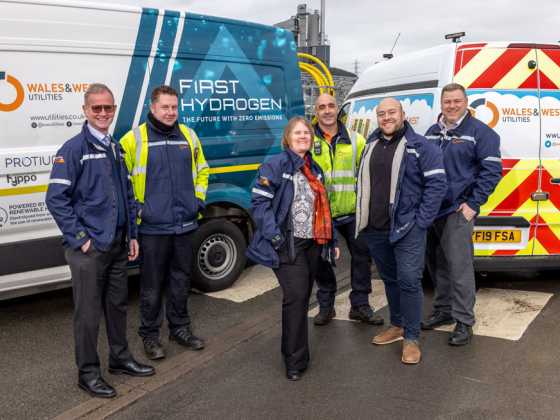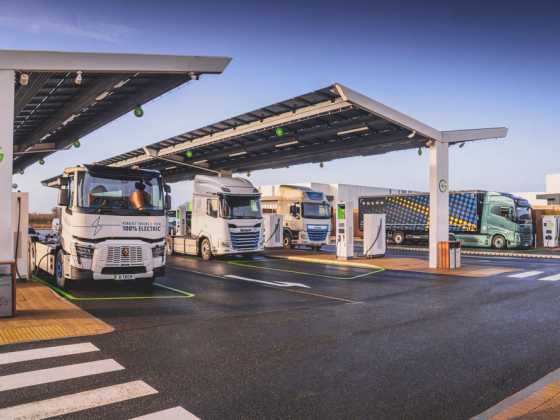From the fryer, to the fuel tank
The clock is ticking again for the duty differential for bio-diesel from used cooking oil, with its planned withdrawal in April 2012, says the UK Sustainable Bio-diesel Alliance

When government announced in December 2009 that it would extend the tax differential for bio-diesel produced from used cooking oil until April 2012, bio-diesel producers across the UK breathed a huge sigh of relief. This was a stay of execution for cutting edge fuel producers and their customers, who were committed to using high-blend bio-diesel in their vehicle fleets.
FIGHTING FOR THE CAUSE
Removal of the tax differential, which the government planned to replace with certificate trading under the Renewable Transport Fuel Obligation, would have resulted in an increase in the cost of bio-diesel of up to 20 per cent, with the inevitable decision by fleet operators to discontinue their use of high-blend bio-diesel and a return to cheaper fossil-based fuels.
The decision was taken by the government after an intensive campaign, led by the UK Sustainable Bio-diesel Alliance (UKSBA) – a group of some 30 UK bio-diesel producers who use only sustainable feedstock, such as used cooking oil, to make their bio-fuels.
They argued that whilst the government might be wary of the differential subsidising producers who used unsustainable sources, causing land-use change or driving up the price of food, targeting the differential to bio-fuels produced only from waste provided a number of advantages.
Waste cooking oil would otherwise be poured down the drain at some £15m p.a. cost to the utility companies or sent to landfill, adding to greenhouse gas emissions. Instead, by encouraging its use in bio-diesel, the government would be contributing to better waste management and would continue to allow the fleets’ vital contribution to the UK’s challenging carbon reduction targets.
In addition, cutting edge green skills within the bio-fuel production sector would be encouraged to develop, delivering vital jobs and nurturing the low carbon economy.
THE AFFECT ON THE INDUSTRY
Chair of the UKSBA, Mark Sneesby, reflects that these predictions proved to be correct: “When we look back at the decision and how it has affected the sustainable bio-diesel industry in the UK, it is clear that a number of our arguments have played out.
“The relative stability in the production base means that we continue to develop the green skills vital to the low carbon economy. We are now developing those skills to tackle other waste to energy projects, such as food waste in anaerobic digestion and second generation bio-fuels.
“Our customer base has grown as more vehicle fleet managers become confident to use bio-diesel blends in their fleet and high profile fleets such as the Environment Agency and Stagecoach buses come on board.
“Because there is now a market for waste, the retrieval of waste products such as used cooking oil has increased markedly in the private sector and some local authorities are now offering domestic waste oil collection facilities at their recycling centres – all of which means less waste to landfill and lower utility costs.
“The only downside has been the increase in imports of used cooking oil to feed the bio-diesel industry, which has not only driven up the cost of feedstock, but raises concerns over the environmental impact through the supply chain, so this is something we will need to address going forward.”
MOVING FORWARDS
And going forward is what the UKSBA now needs to do. The clock is ticking for the tax differential again, with its planned withdrawal in April 2012. The Renewable Transport Fuel Obligation (RTFO) is still under consultation given the implementation of the Renewable Energy Directive from Europe and further reviews are planned before 2014. This means that certificates trading under the scheme remain volatile in value and do not currently offer a stable income alternative for bio-diesel producers.
Mark Sneesby: “The UKSBA is in discussions with the new government to argue our case that the tax differential must continue beyond 2012, until the RTFO is fully implemented and has had time to prove it can work to adequately support the industry.
“The UK is currently 25th out of 27 countries in the EU in its use of renewable energy, lagging behind at 2.2 per cent against a target of 15 per cent by 2020, 10 per cent from transport alone.
Transport emissions are actually rising and so the government can’t afford to cut off at the knees an industry that is already making a positive contribution to the reduction of carbon emissions.
“For a very modest cost in terms of the subsidy, the government has the opportunity to increase waste recovered, reduce waste to landfill, generate green jobs, encourage regional development and the low carbon economy, secure inward investment and assist energy security – a no brainer.
“The UKSBA will continue their campaign for joined-up thinking in government to develop a clear sighted green policy for the transport sector. Only then will bio-fuel producers and their customers have the long term stability for effective business planning and investment.”
CASE STUDY: THE ENVIRONMENT AGENCY
Convert2Green Ltd, a founding member of the UKSBA, has now become one of the UK’s leading waste to energy providers. The company was thrilled when, at the end of 2010, the Environment Agency came on board with a plan to supply its transport fleet with bio-diesel from used cooking oil, as part of its overall goal to reduce its C02 emissions.
Convert2Green is supplying five of the Environment Agency’s (EA) operational depots in England and Wales with B25 bio-diesel recycled from 100 per cent waste vegetable oil, taken from fully sustainable sources in the UK.
The whole waste to energy process is organised by Convert2Green, which offers a national oil collection service, running its collection vehicle fleet on bio-diesel. The oil is then processed at Convert2Green’s plant, powered by its own bio-fuel, with the bio-diesel delivered to customers in tankers operating on bio-diesel.
The carbon saving of up to 90 per cent is passed through the supply chain to the customer, making mileage as green as possible for the EA.
“Transport has one of the largest impacts on an organisation’s carbon footprint,” explains Andrew Webb, director of Convert2Green. “Most organisations are realising that it’s possible to reduce CO2 emissions enormously and deliver up to a 90 per cent reduction in lifecycle carbon emissions by using a low carbon and sustainable fuel source for their transport fleets – it makes a huge impact on a company’s green targets.
“Indeed many of our customers are now finding that use of our bio-diesel lends them a competitive advantage when tendering for contracts, as many companies seek to green their supply chain.
“For Convert2Green to be working with the EA to help it achieve its goals is a fabulous endorsement of what we try to achieve daily and is an example to other organisations trying to achieve the same. The EA has a strongly held commitment to minimising CO2 emissions and reducing its impact on the environment has driven it to find a sustainable source of fuel for its road fleet.”
CASE STUDY: GREENER BUSES
Merseytravel and Stagecoach are launching a new green initiative to run buses on bio-fuel supplied by Convert2Green, as part of their commitment to the European BIONIC project.
The BIONIC project, funded by the European Commission and Intelligent Energy Europe programme and coordinated in Europe by Merseytravel, promotes the production and use of sustainably produced bio-fuels.
Merseytravel is supporting the two year trial by funding the refuelling infrastructure to allow some of the Stagecoach fleet to run on B30 bio-diesel, supplied by Convert2Green – all three partners are members of the Merseytravel run North West Biofuels Network.
The B30 biodiesel mix includes 30 per cent biodiesel from waste vegetable oil which calculates the overall CO2 emissions from the buses as up to 25 per cent less than using standard diesel.
The trial is crucial to providing confidence in bio-fuels by UK bus operators, promoting a wider uptake of sustainably produced bio-fuels in the public transport network and continuing its progress as a low carbon and sustainable fuel source.
The trial results, which will be published by Merseytravel, will monitor vehicle reliability and fuel consumption, with the lessons learnt being used to support other bus operators who want to use sustainable bio-fuels.
Neil Scales, chief executive of Merseytravel said: “By supporting this trial and working with local producers, we are at the forefront of promoting fully sustainable bio-fuels and significantly reducing CO2 emissions.”
Councillor Mark Dowd, chair of Merseytravel added: “Not only will the trial help us to address carbon reduction, it will also help us develop a greater understanding of the benefits of new bio-fuel technology, which we will be able to share with businesses throughout the region.”
FOR MORE INFORMATION:
For further information about the UKSBA, contact Mark Sneesby on 01606 833330. For information on Convert2Green contact
Deborah Webb on 01606 833330 or visit www.convert2green.co.uk






